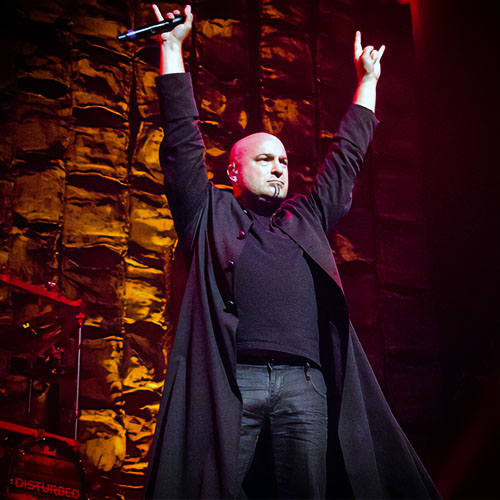Lots of rock stars spend money on expensive houses, sports cars, chicks, and music gear. Korn front man Jonathan Davis is no exception.
Kornucopia
The band’s success — a debut on the Epic imprint Immortal Records that went platinum, follow-up records that flirted with the top of the pop charts, and a headlining gig on the popular Family Values summer tour, which the band originated — has allowed him to indulge himself. Davis even makes sure he has plenty of dead presidents to generously finance one other obsession: collecting the art and artifacts of nefarious serial killers.
The walls of his Hollywood home are decorated with smiling-clown paintings by John Wayne Gacy Jr., who raped, tortured, and killed more than 30 boys and young men in Chicago. The house is also adorned with satanic drawings by the Night Stalker, Richard Ramirez, who offed 13 folks in Los Angeles in 1984 and 1985. Davis is especially proud to own Gacy’s “Pogo” and “Patches” clown suits and a framed confession letter from Albert Fish, the 1920s cannibal who slaughtered and ate many children, then sent letters describing his deeds to the victims’ grieving families. Plus, Davis owns the Volkswagen that Ted Bundy drove around college campuses when he was prowling for prey.
“I love investigating the darkness,” Davis says from a black leather couch in his publicist’s office in L.A. “The people who think that me doing this is sick and wrong and weird are the ones that make this country so fucked up and conservative.” He lifts a glass of Coke from a fuzzy leopard-print coaster that sits on a light-blue oval coffee table and continues: “The psychological aspects of the criminal mind are really intense and worth exploring. Why did Hitler kill six million Jews? What made him go that fucking nuts over a race to try to kill them off? What made Richard Ramirez or Jeffrey Dahmer kill all those people? I find all that stuff really interesting.”
Hoping his enthusiasm is as infectious as a plague epidemic, Davis has joined forces with archivist and collector Arthur Rosenblatt and artist Joe Coleman to create a serial-killer, true-crime, and human-oddities museum in L.A. When Davis isn’t howling away with Korn, recording one of his macabre side projects, or having his way with wanton women, he’s coordinating the museum’s exhibits and expanding the collection.
For many celebrities, collecting art, launching a museum, or starting a restaurant are mostly entrepreneurial pursuits, but Davis’s serial-killer fixation stems more from a subconscious need to understand, and be understood. “I’ve always been enticed with trying to figure out why someone would murder lots of people in hideous ways,” he says. “Collecting these artifacts helps me deal with that behavior. I like to get in their minds, and find out what made this person hack up bodies.”
Dressed in jeans, a gray Calvin Klein T-shirt, Ponys, and thick black-framed glasses, Davis doesn’t look like either a murder obsessive or a world-class rock star, but after 30 seconds of watching him onstage, it’s clear that those roles are a perfect fit. When he performs he snarls, lunges, and screams until his eyes are mere slits and his face is strawberry red. His latest stage prop is an eerie gleaming mike stand that was created for him by Swiss erotic surrealist H. R. Giger. The sculpture is of a bare-breasted woman with a monstrous head, similar to one of the creatures Giger conceived for the Alien films. During shows Davis cradles and caresses it like a sociopath might a blow-up sex doll.
“She’s just the most beautiful thing ever,” he boasts, then adds, “but I originally wanted it more explicit. I love the weird erotic stuff Giger does with dicks and pussies.”
Davis’s compulsion to examine a side of humanity that most people either deny or choose to ignore is part of what makes Korn so cool and credible to a legion of frustrated and angry fans. Unlike so many of today’s platinum-selling nu-metal groups, the mental anguish and aggression in Korn’s music comes from within. Davis and his band-mates may be pretty well off financially, but emotionally they come off as being as unstable as the adolescents who worship them. They’re also a favorite of a number of other rock musicians, including Disturbed front man David Draiman. “It was Korn’s first record that made me want to play this kind of music,” Draiman says. “Jonathan is able to use his voice and express his pain in such a therapeutic way, and that really inspired me. You sometimes have to suffer a little bit to get healed.”
A betting man would probably have wagered against Jonathan Davis ever becoming a world-famous rock star. At one point it seemed unlikely he would even make it past adolescence without going postal. He was born on January 18, 1971, in Bakersfield, California, to a housewife mom and a struggling-musician dad who divorced when Jonathan was three years old. Soon after, Davis moved in with his grandparents, and since he suffered from respiratory problems, he says he was unable to do much besides sit in front of the television and struggle to breathe: “I was diagnosed with asthma, and I was in and out of the hospital from then to the time I was ten years old.”
Davis has claimed in the Korn song “Kill You” to have been taunted and psychologically abused as a young boy by his step-mother. But the abuse from his family paled in comparison to that received outside the house. Since he was sickly, he was the neighborhood punching bag, and as a preteen he was sexually molested by a friend of the family. Then, when he told his parents, he says they accused him of lying. He later wrote about the episode in the song “Daddy”: “You’ve raped/ I feel dirty/ It hurt/ As a child / Tied down … No one hears me/ It hurt/ I’m not a liar.”
Davis started playing the drums at age five, then learned basic piano. Later, inspired by his grandmother’s bagpipe playing, he picked up that instrument and joined a bagpipe band in high school. As if that weren’t enough to make him the classroom whipping boy, Davis wore eyeliner and other makeup to emulate his new-wave idols. The abuse he endured for being different only strengthened his resolve, and inspired the Korn song “Faget,” one of the staples of the band’s live set.
When he was 16 Davis entered a job-placement program to become a respiratory therapist, but the position was already taken, so he accepted a job at the Kern County coroner’s office. “I was like, ‘Oh cool, I’ll be able to see dead bodies and cut them open,’” he recalls. “The first day I was pretty weirded out and I was white, but after the second and third time I was totally into it. I liked trying to figure out how people died, and the anatomy of the body was amazing. And just the fact that you’re cutting a fucking person open and you’re not going to jail is so wild.”
After high school, Davis moved to San Francisco to attend the College of Mortuary Science for a year. Then he returned to Bakersfield to work as an apprentice embalmer, but his funeral-home career was killed when he joined the group Sexart, which also featured Adema bassist Dave DeRoo and Orgy guitarist Ryan Shuck.
Bassist Reginald “Fieldy” Arvizu, 32, had known Davis from a young age, since their dads used to play in a band together. But for years the two didn’t like each other, and the heftier Arvizu would bully his future singer, chasing him on his dirt bike and threatening to kick his ass. Arvizu grew up in a musical family and was exposed to a variety of rock music, but it was West Coast hip-hop that really motivated him to flavor his bass playing with a funky R&B and rap-influenced groove.
Guitarists Brian “Head” Welch and James “Munky” Shaffer were juvenile delinquents who met in high school on a rare day when they were both attending classes. Shaffer, born in Rosedale, California, in 1970, grew up in a middle-class family and only started playing guitar in his mid-teens to help rehabilitate his hand, which he had injured in a biking accident one night after sneaking out of the house. As he’d tried to pedal away as quietly as he could, his bike chain slipped off the wheel, making a loud grinding sound, so he’d grabbed at the flailing rope of metal, which severed the tip of his left index finger.
Welch, who was born in Torrance, California, in 1970, was already playing guitar when he met Shaffer, so he taught his new friend a bunch of easy metal songs; pretty soon the two were jamming. At age 17, Welch left home and delivered furniture by day and pizza by night. He also played with Arvizu in several bands, including Ragtime.
Shaffer, Welch, and Arvizu eventually came together to form the band LAPD. One night they were in a club checking out local Bakersfield groups when Sexart took the stage. They were impressed by Davis’s sinister delivery, and since they had just parted ways with their singer, they asked Davis to join their band. The last addition was drummer David Silveria, who at 30 is the youngest member of the Korn crop. Having played drums seriously since age nine, Silveria had more than enough firepower.
Two weeks after Korn was formed, the guys recorded a demo with producer Ross Robinson, and for the next 12 months they toured up and down the California coast until they scored a label deal with Immortal Records.
The band’s self-titled 1995 album helped kick-start the so-called nu-metal movement. Expanding upon what groups like Faith No More, Prong, and Helmet had pioneered, Korn created a heavy, hate-filled hybrid of heavy metal and alternative rock that also incorporated elements of funk and hip-hop. The delivery was darkened by the instrumentation, which included seven-string guitars tuned considerably lower than normal and five-string basses that provided extra rumble to the tumble.
Latching on to the propulsive grooves of songs like “Shoots and Ladders,” “Need To,” and “Blind,” metal fans embraced the album, and the guys leapt at every opportunity to promote themselves. “When we started out there was nobody making this kind of music, so we had nobody to tour with,” said Arvizu. “We were like, ‘Fuck, we want to play. Who can we do this with? Megadeth?’ I didn’t want to go on tour with fucking Megadeth, but we did it.”
Korn’s determination paid off, and the album eventually went platinum. The group’s 1996 follow-up, Life Is Peachy, proved Korn was no one-trick whore. While the band didn’t offer much radically new to the sonic formula, songs like “Twist” and “Good God” proved it had staying power. That disc also went platinum, after hitting No. 3 on the pop charts, but it was the more commercial and experimental third album, 1998’s Follow the Leader, that catapulted the group to megastardom. The CD debuted at No. 1 on Billboard’s Hot 200, “Got the Life” became a radio mainstay, and “Freak on a Leash” won two MTV Music Video Awards. Korn celebrated its good fortune like a bunch of champs, bagging babes, partying hard, and smashing tons of shit. But they also invited lots of friends along by conceiving the nu-metal Family Values festival — which helped launch the careers of Limp Bizkit, Staind, and Orgy — and by developing Elementree Records, to which they signed the bands of various friends and other promising groups. Their next release, Issues (1999), also debuted at No. 1 and went on to sell more than four million copies. But with fame came added pressure.
“I’ve become known for my outbreaks and my rock-star temper tantrums,” Davis admits. “But I learned from those experiences that it’s better to keep your head on fucking tight. It’s just hard when you’re nobody one minute, and then the next day you wake up and you’re this huge fucking rock star. That really freaked us out. And we had to go through a crazy adjusting period because we weren’t getting along and we were going crazy because of all the fame. Then I discovered Prozac, and that helped me deal with a lot of things.”
Arvizu has also learned to chill. There was a time when he’d get so pissed off in the studio that he’d scream at Davis and the band’s producer on a regular basis; but now, having undertaken a regimen of self-medication, things have changed. “I smoke weed every day to start out the day with a smile on my face,” he says, then giggles. “I’m really outspoken and opinionated, and no one likes a winner. But the weed makes me more laid back and not as uptight.”
“I don’t kiss girls because I don’t know how many dicks they’ve been sucking. Its just not as fun as it used to be.”
Fortunately, the bassist’s stoned demeanor didn’t damage the group’s most recent release, this summer’s Untouchables. Combining visceral grind with eerie, contagious melodies, the disc might be Korn’s moodiest, most personal offering to date. Instead of griping about unpleasant experiences from the past, Davis confronts his present-day passion and pain, ranting about his ex-wife, star-fuckers, opportunists, man-eaters, various backstabbers, and, yes, mass murderers with the conviction and intensity of someone who has too much integrity to dupe his audience with manufactured hype.
“I think I was just born this way,” he says of his dark obsessions. “I’m happy at times, but nothing ever inspires me that’s truly happy and great. The things I get off on are all morbid, and my whole life I’ve collected and done dark things. I cut dead bodies open when I was a kid, for God’s sake. I’ve always been drawn toward this kind of stuff.”
In the same way that Davis’s art collection hints at the demented lives of violent criminals, the cathartic, agonized music on Untouchables reflects the years of indecision, insecurity, rage, and ugliness that have passed since Korn’s previous album was released. Romantic disillusionment was probably the greatest factor poisoning the well, as revealed by lyrics like those of “Bottled Up Inside”: “My heart is breaking / Man you really ripped it out/ You take pleasure watching as I claw my way out/ Sometimes I wish you’d die.”
Divorce can have that effect on people. Since Issues, Davis, Arvizu, and Welch all have legally parted ways with their wives, and Silveria is recently separated. “We just grew apart to the point where I said, ‘Look, we just don’t have anything in common anymore,’” says Arvizu. “When I was on the road I’d call my wife, but she didn’t want to hear about what we were doing on tour, so we didn’t have anything to talk about. Basically, groupies and strippers are the only girls you can relate with when you do what we do, unless you can find the right girl that’s totally interested in your career. And that’s really rare.”
“Man, I don’t wish divorce on anyone,” says Davis, shaking his head. “It’s so traumatic. It’s especially hard if you run into a little bit of money, because you go through all the hell of having all your shit taken away and threats to have your child taken away.” He stretches his arms, leans back, and adds, “I just don’t think it’s possible to keep a marriage together when you’re a rock star. We go out on the road for years at a time. We have tons of beautiful women trying to fuck us. You just have to find that special lady that can deal with that.”
Then, at around the same time that their home relationships began to fall apart, drummer David Silveria had to drop off the tour in March 2000 because he was suffering pain and numbness in his arm and wrist that left him unable to play. The band finished the tour with former Faith No More drummer Mike Bordin, but Untouchables was put on hold while Silveria recovered from surgery and physical therapy. “It was crazy,” says Davis. “The doctors found out he had an extra rib that was causing the trouble, and they had to remove it so he could play again.”
While they waited, Davis spent much of his time scoring, and not just with women. He wrote the classical orchestrations and rock songs for the vampire flick Queen of the Damned with composer Richard Gibbs, and hooked up with horror novelist Clive Barker to create music to accompany DVD images of Barker’s gruesome paintings. During that time, Arvizu recorded a critically reviled solo hip-hop record called Rock ‘n’ Roll Gangster under the moniker Fieldy’s Dreams.
“The whole thing started out as kind of a joke,” Arvizu says, a touch defensively. He adjusts his backwards baseball cap and leans back in his seat like the “Baby Hugh Hef” character he assumes on the record. “I was talking about doing it, and then I started seeing it in magazines, and I’m like, ‘Shit, man, I ran my mouth. This is something I need to do now.’”
With Silveria mended by January 2001, Korn started working on Untouchables. They hired pricey producer Michael Beinhorn (Hole, Aerosmith, Red Hot Chili Peppers) and headed into a studio in Long Beach, California, to start making magic, but the rabbits failed to emerge from the musical hat. Unable to concentrate so close to home, they re-located to a deluxe digital studio in Phoenix. It was the beginning of a process that left the band’s accountants pounding the Maalox.
“We spent close to $4 million on this record,” says Arvizu. “It just happened. We rented five homes for $8,000 a week, and it was fun for a while. I had a strip pole in my living room. And I’d bring these totally drunk girls home and make them sign disclaimers in case they got hurt and wanted to sue. A few of the chicks flew off the pole and cracked their heads open. The funny thing is, they weren’t even strippers. They’d just look and see there’s a pole, and they don’t know how to get on it. So I just sat around laughing at them, watching them eat shit.”
“One reason we chose to do the record in Phoenix is because it’s the titty-bar capital of the world,” Davis adds “We would have big nude pool parties. And we set up a badminton court in the house and we’d have girls get naked and play badminton.”
The novelty of watching naked women tumbling from strip poles and bouncing to swat birdies only captivated them for so long, so the gang left Phoenix early and headed back to L.A. Suddenly the band’s creativity began to flow, and four months later they had written most of Untouchables.
Unlike their other discs, this recent album is as dynamic and melodic as it is abrasive. Davis, who has trained with a vocal coach over the past year, sings with more passion, confidence, and virtuosity than ever, and his band provides an impressive range of atmospheric variation and stylistic nuance. Instead of merely bludgeoning away with down-tuned guitars and alternately moaning and howling vocals, Korn explores new sonic domains, including new wave, sound-track music, even pop. “A lot of new bands have totally stolen our thing that we helped invent, so we gotta keep changing to survive,” Davis says, running a hand through his overgrown black hair. “My favorite singer was Freddie Mercury, because he had a beautiful voice and he was a great performer as well. That’s the kind of heights I’m aspiring to.”
What’s most impressive about Davis is the way he expresses rage and vulnerability at the same time. Like Nirvana’s late Kurt Cobain or Nine Inch Nails’ Trent Reznor, Davis is powerful and loud, but his voice quivers with insecurity and self-loathing. “I’m just being true,” he explains. “I’m not trying to go up there and say, ‘Fuck this, I’m a bad motherfucker.’ I’m not that guy. I’m a fucking nerd, dude. I was always a nerd growing up. I was picked on, called a faggot, and that shit’s never gonna change. I’m a rock star now, and people still call me a fag. And there’s all these things on message boards about how I suck dick and fuck guys, and you know, it’s never gonna change. So fuck it. I have lots of hate inside of me from things that happened to me from my childhood and from my divorce and from just everyday life.”
Lyrically, Untouchables touches on themes of exploitation, abuse, and anti-authoritarianism. The title is a reference to the caste system in India, in which the lowest strata of society, the untouchables, are often spat upon and mercilessly attacked. Davis compares many of the band’s fans with these outcasts of society. The song “Thoughtless,” for example, examines the Columbine murder spree through the eyes of the taunted, socially outcast killers. “I totally understand why kids go and blast people at schools because of the teasing I went through when I was young,” Davis says, unafraid of the controversy the song is sure to provoke. “The teachers didn’t really give a fuck, and they joined in on the teasing. And when you don’t have parents you can go to, and you can’t talk to the teachers, and these kids are constantly heckling and hurting you, you get to a point where you can’t fucking take it anymore.”
The first single from Untouchables, “Here to Stay,” isn’t as violent, but it’s just as abrasive. “It’s about being fed up with the people who take advantage of me all the time,” grumbles Davis. “People come around to try to be my friend for money or for the fame or whatever they can get from me, and so I don’t even go out in Los Angeles anymore because someone always has some deal going for me. I’m just tired of that. I want to do what I want to do, and I don’t want to feel bad about it.”
Untouchables is undoubtedly driven by anger and attitude, but it also throbs with raw sexuality. Arvizu and Silveria play surging rhythms that pulse with the power of a good fuck, Welch and Shaffer create shimmering, seductive guitar webs, and Davis coos and croons like a vampire luring unsuspecting vixens into a netherworld of depravity. At first glance, Davis doesn’t exactly look like a ladies’ man, but ten years of on-the-road experience have made him an expert in the art of seduction, and enabled him to explore his darkest erotic desires. “I’m the kinkiest motherfucker you’ll ever meet,” he boasts. “I don’t drink or take drugs anymore, so the only thing else I’ve got is sex. I do freaky, weird shit. I’ve made girls piss in cat boxes. I’ve taken a drill gun and put a rubber on the end of it and drilled out a bitch’s pussy. I’ve seen girls bend over and had guys hock loogies on their asses, and whoever gets the ass hole gets to fuck her. It’s insane.” He smiles, as if recalling the many episodes.
Davis is engaged to former girl-on-girl porn actress Deven Davis, who works for Jill Kelly Productions as a spokesmodel, but that doesn’t mean he’s tied down. “We have a liberal, free relationship, which I love, so I can pretty much still do whatever I want,” Davis says.
Now that he’s single again, Arvizu is soaking up the swinging-bachelor life-style as well. He hits the strip clubs pretty much every night and revels in the perks of being a rock star. “It’s like being a kid in a candy store, only the candy’s all free,” he says. “With some of the shit I do, I think it’s pretty safe to say the girls I was with the night before are never gonna call me again. Either I’ve kicked them out of my house or I’ve actually been at a club with another girl right in front of them. Then the next day I’ll see my phone ringing, which is crazy. But the thing is, you really can’t get as freaky as you could back in the day. I’m not going down on some chick, and I’m wearing a condom all the time. I don’t kiss girls because I don’t know how many dicks they’ve been sucking. It’s just not as fun as it used to be.”
Two months before Untouchables was released, all 14 songs were leaked over the Internet, conceivably costing the band and its label millions of dollars in lost sales. Korn, however, took its misfortune as an opportunity to convert listeners who might otherwise have been on the fence. “We’re not gonna fight the record company’s battle,” says Davis. “They’re all upset about it, but they’re hypocritical, really. Sony is actually making these machines that burn CDs. And then they try to fight themselves. So I encourage anyone to fucking download it. If you like it, you’ll become a fan.”
“Say 30 million people burned the CD,” adds Arvizu. “Well, now they’re Korn fans, and they’re still gonna come see us in concert.”
The night before Untouchables hit the shelves, Korn celebrated by playing a special show at New York City’s Hammerstein Ballroom that was simulcast to 40 movie theaters across the country. It was the group’s first U.S. date in years, and they were on fire. Davis, adorned in a velvety black goth dress decorated with two giant crosses, was undergoing an especially revelatory session of primal-scream therapy as he vented his psychosexual angst for the awestruck crowd. Arvizu, dressed in a blue football jersey that read JOKER 69, was flailing his head, his cornrows lashing his face and neck, and when he played he pointed the neck of his bass straight to the sky. Meanwhile, Welch and Shaffer were slung over their guitars, strumming with enough menacing force to cause permanent hearing damage, and Silveria punished his drums with the power of a gladiator.
They played with the brutality of soldiers ravaging an enemy village, but backstage after the show, Korn was all smiles. Even though they were soaked with sweat, they embraced in a warm group hug. Still euphoric from the crowd’s ecstatic response, Davis raised a bottle of water to his lips and exclaimed, “Dude, that’s what it’s all about, I’m telling you.” He laughed, baring his gleaming teeth, then inhaled noisily. “Seeing 15,000 screaming kids freaking out and singing every word — that’s what keeps us going, no matter how rough things get.”
Should you find yourself feeling particularly Korny, you might consider their visually arresting site. Of course, you can stay in genre just within these digital pages, in search of an Orgy — or potentially Disturbed by that. (Sometimes we just cannot help ourselves, although in fairness we do not really try all that hard.)






















